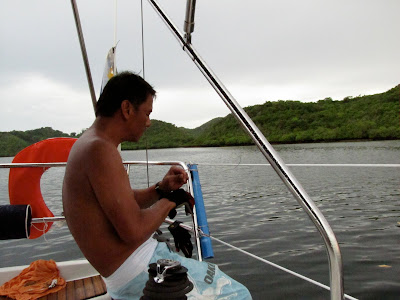Whenever people find out that I’m going sailing, they get into oohs and aahs and say how they would love to be in my shoes. I think they imagine that all we do is sit back with a frozen margarita in one hand and a book in another. What they don’t realize is that sailing is hard work. If they knew what our life on a sailboat is like, I bet they would prefer to stay home and watch TV.
Sailing is not a luxury. Unless you are Larry Ellison (which we’re not) or at least have his kind of money (far from it), own a luxury powerboat (which we don’t) and a crew to serve you (it’s just my husband, daughter and myself on our boat), expect to get your hands dirty.
Our days are full when we’re sailing. To start off, we plot our course, an exercise that requires concentration and a steady hand- choose the destination(s), mark the waypoints, get its coordinates (using a paper map, ruler, pencil and compass) and enter the coordinates in the GPS chartplotter.
Then you raise the sails and trim them regularly to adjust to the changing wind, wave and current. You huff and puff through the day as you pull and release tight ropes, turn winches and adjust travellers. You lift the anchor at the beginning of the day, and look for anchorage and drop anchor at the end of the day, a task that has its own share of anxiety (see this post). And every time we drop anchor, we untie the dinghy from the bow, lift it over the lifelines (which feels like doing an overhead press) and into the water, unscrew the engine from the railing outboard mount and attach to the dinghy. Which means, of course, we do the reverse before we lift anchor the next day.
And once you’re smoothly sailing, you still can’t sit back and have that margarita. Be alert, watch your course, keep an eye on your position on the chartplotter, your compass bearing, boat speed, wind speed & direction, wave direction and current. Watch out for ships, boats, fishermen, buoys, nets, lines, markers. A small banca may have a large net set for up to half a kilometer around it. Be on the look-out for shallow reefs, coral heads, outcropping rocks and, in Busuanga, pearl farms.
Before mealtimes, Raul keeps watch as I cook below deck. After meals, wash the dishes. To save fresh water, rinse first with salt water then soap and wash with fresh water. Take out the garbage- perishables go overboard, everything else is rinsed first to prevent a stink and stored at the end of the storage room.
Then there’s the housekeeping. Clean all the cabins and bathroom, fold the beds, rinse the deck. Hang the wet clothes and fold the dry ones before the boat starts looking like a floating sampayan. At night, unfold the dining table and turn it into Mariel’s bed; every morning, fold it back into a table. Bring out the generator once in a while and charge it. Before turning in for the night, get water and other drinks from storage and refill the refrigerator so they’re cool by morning.
 |
| Mariel- her bed at night, dining table during the day |
To add to the hard work are moments of stress. Despite meticulous preparations, something always breaks down- I caught Raul once at midnight on all fours bailing water from the bilge with a sponge. Or we are at the mercy of Mother Nature- squalls come unexpectedly or a low pressure area starts building up and, horrors, turns into a tropical depression.
 |
| Raul fixing the fishing rod holder, just one of many repairs that need to be done. |
It is hard work and guess what? I will not exchange it for anything in the world. As I lift and pull and wash dishes and labor through the day, all I have to do is lift my head and see all the beauty and my family around me. And at the end of the day, as I stretch my swollen muscles and feel my calloused hands and feet, I do get to sit back with that frozen margarita, snuggled on deck with my husband with Mariel’s ukulele playing in the background, as I eagerly await what kind of sunset is in store for me today in this new destination. This is luxury for me. What is it for you?
 |
| Priceless reward at the end of a tough day. Absolutely no retouching done on this shot. |


6 comments:
I became aerobic just reading your post! I admire your energy and passion!
i'd like to do that someday =)
:)
A nice twist! Well done!
Nice to have a hired deckhand.
Hi there!
I was visiting Talonggo and he recommends stopping by and I'm glad I did. You know, you really are so lucky. Not because you're sailing but mainly because you have your family with you in your journey. I think it's a luxury that seamen can't afford, being with their family always. Well anyway, look at that sunset, isn't the world just amazing? Boom de ah dah!
Wow. Nice sunset shot!
Tip on lifting the outboard into the dinghy:
clip one of your sailing dinghy mainsheet systems to a sailtie on the boom. Connect the other end to the top of the outboard. Use the block and tackle to lift the outboard, and lower it into the dinghy, detach the bock and tackle from the outboard after it has been installed on the dinghy.
This is how we do it on the bigger boats with big outboards.
Post a Comment